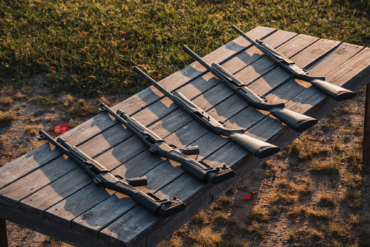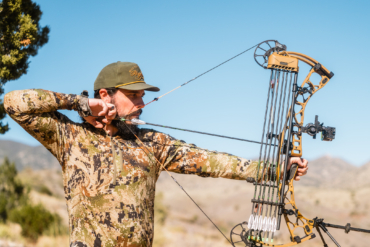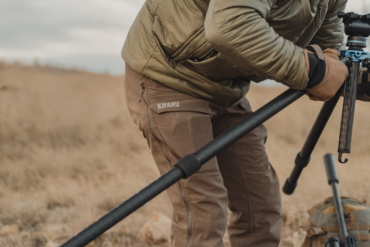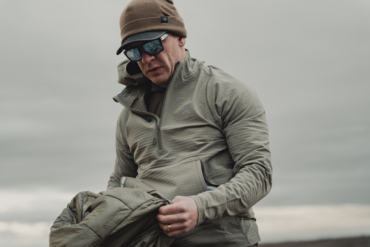For many, fall means blaze orange, bows, and bullets. Here are some pointers to be safe during hunting season—for hunters and non-hunters alike.

Bright colors, crisp mornings, clear skies—fall is a fantastic time to get outside. It’s also prime time for hunting. We reached out to Idaho Department of Fish and Game spokesman Roger Phillips to get some pointers on how to safely share open spaces during autumn hunting season.
Be Safe During Hunting Season: Tips for Non-Hunters
There is little to fear when hitting the woods during hunting season. Most hunters are cautious. Due in part to hunters’ safety requirements, shooting accidents while hunting are rare.
National statistics are hard to find as most accidents are managed by state agencies. But most hunting-related shooting accidents are self-inflicted or are caused by poor handling of firearms around other members of a hunting party.
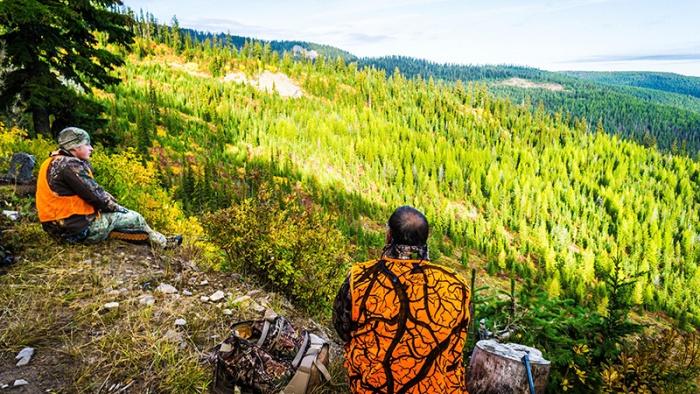
It is a hunter’s responsibility to be extremely safe with shots taken and when handling firearms (more on this below). But there are a few things you can do to safely share the woods with hunters.
Blaze Orange
It’s not a natural hue and prominently sticks out in the woods. Hunters wear it (and in some states, blaze pink) to identify themselves from other hunters, so they will be quick to identify you. “But any bright-colored clothing will do,” shared Phillips. “Avoid white, grey, brown, black, or other colored clothing that might resemble game.”
Know Your Seasons
Hunting seasons have specific start dates. Check your state regulations for more information on hunting seasons in your area. The U.S. Fish and Wildlife Service publishes hunting seasons by state.
Know Where To Go
Almost all Bureau of Land Management and National Forest land is open for hunting. Some regions (cities and some national parks) forbid it. Check your area’s rules and regulations to see if the land is hunted.
Know When To Go
Hunters get out early and stay out late. Phillips said, “Going midday reduces your chances of encountering hunters and also makes you more visible than low-light hours at dawn or dusk.” It also reduces the chance of you spoiling a hunt by spooking game animals as they move during the crepuscular period.
Make Noise
You don’t need to shout at yourself like you are trundling in bear country, but normal outdoors conversation will alert hunters that you are in the area. The human voice carries remarkably far in the woods.
While sitting quietly hunting, GearJunkie editors have heard people chatting hundreds of yards away. Most likely, hunters will know you are there and that you are human, even though you never cross paths visually.
Protect Your Dog
Many hunters have dogs, too. But if traveling in known hunting land with a wolf- or coyote-like canine, you might want to keep them leashed and get them suited up in blaze orange. Even a bright-colored hanky tied to the collar will alert a hunter that the animal isn’t game.
Be Respectful
This land is our land, and we each enjoy it for different reasons. Once you pass the hunter, be quiet so not to disrupt their hunt.
Not comfortable traveling during hunting season? Phillips recommended looking for areas where hunting is not allowed or staying closer to towns that aren’t likely to attract hunters.
Tips for Hunters
Get Certified
If you haven’t already, it’s a good idea (and usually required by law) to get certified through your state’s hunter safety program. Most states require it if you are under a certain age. Online courses can also be taken through the International Hunter Education Association.
5 Essentials
Like any backcountry trip, follow a standard protocol including:
- Check the weather. Fall weather can be finicky and flip on a dime.
- Leave your itinerary. Tell someone where you are going and when you will be back.
- Carry enough food and water. You will likely be out many hours.
- Bring a first-aid kit, map, and compass. Getting lost in the woods is a real risk when hunting.
- Bring dry clothes. Hunting can be wet business, and hypothermia is a very real threat.
Golden Rules of Gun Safety: T.A.B +1
These are taught in hunter’s safety courses nationwide, but it’s always good to refresh the rules of gun safety before heading afield. For the four primary rules, remember “T.A.B. +1.”
1. Treat every firearm as if it were loaded.
2. Always keep the muzzle in a safe direction.
3. Be sure of your target and what is beyond.
4. +1 Keep your finger outside the trigger guard until ready to shoot.
And remember the rest of the “10 Commandments of Gun Safety.”
5. Check your barrel for obstructions and use proper ammunition.
6. Unload firearm when not in use.
7. Never point a firearm at anything you do not intend to destroy.
8. Don’t run, jump, or climb with a loaded firearm.
9. Store firearms and ammunition separately and safely.
10. Don’t drink alcohol before or during shooting.
Whether you hunt the woods to fill your freezer or hike peaks to enjoy the fall color, fall is a popular time to be outdoors. These basic guidelines help all users share the forests, mountains, and meadows safely and enjoyably.




